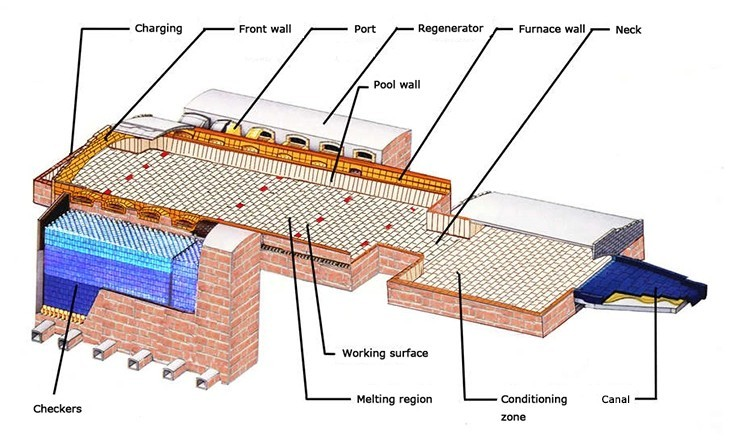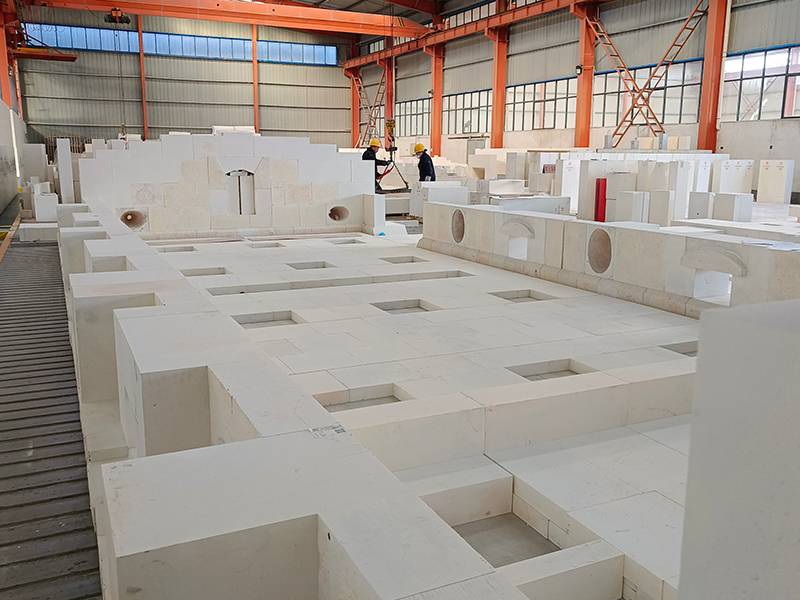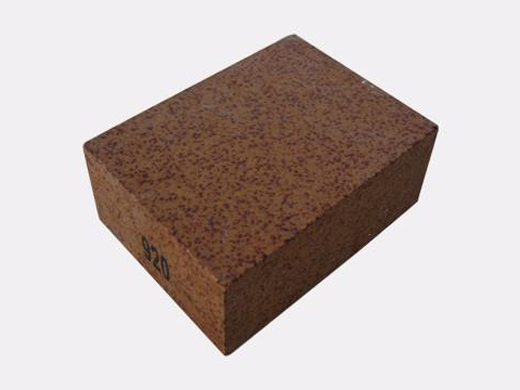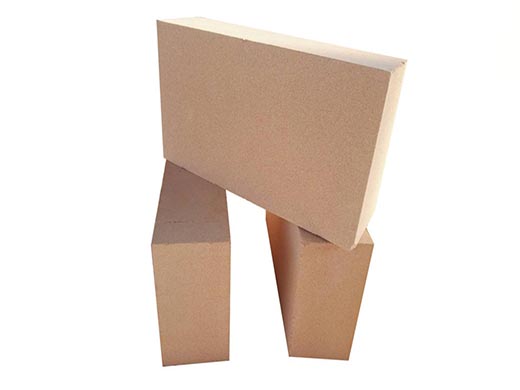News detail
Selection of refractory materials for glass kiln pool wall
Parts in contact with glass liquid
The parts of the pool wall of the melting part and cooling part that are in direct contact with the glass liquid are subject to high temperature, chemical erosion caused by the glass liquid and mechanical and physical scouring caused by the flow. The most important condition for the refractory material in this part is to have good resistance to glass liquid erosion and not to pollute the glass liquid.

Fused zirconium corundum bricks, α-β corundum bricks and β corundum bricks are commonly used for masonry outside domestic glass kilns. Fused zirconium corundum bricks have excellent high temperature and glass liquid resistance. This is because it has obtained the eutectic of baddeleyite and α-AI203 with very good corrosion resistance that sintered refractory materials cannot obtain, so it is very suitable as a pool wall brick for the melting part of the glass kiln.
The main crystal phase of α-β corundum bricks and β corundum bricks is corundum, and the glass phase content is only 1%-2%. They have good corrosion resistance. Compared with the performance of fused zirconium corundum bricks, since they do not contain ZrO2 crystals, the viscosity of their reaction layer is small and they are not very stable at high temperatures. Therefore, the diffusion rate between the surface of the brick and the glass liquid is relatively large, and the kiln lining is damaged faster. However, when the operating temperature of the kiln is lower than 1350℃, the corrosion resistance of a-β corundum bricks and β corundum bricks is better than that of fused zirconium corundum bricks. Therefore, a-β corundum bricks and β corundum bricks are ideal refractory materials for cooling parts and other parts when the temperature is lower than 1350 degrees Celsius.
Parts that are not in direct contact with the glass liquid
The part of the pool wall of the melting part and the cooling part that is not in direct contact with the glass liquid (also called the breast wall), this area is mainly affected by the scouring of alkali vapor and batch materials. Depending on the design, some use corundum materials and some use silica bricks. Both materials can meet the requirements. Therefore, hook bricks and straight bricks are often used in this part.
Considerations
Working temperature: The pool wall of the glass kiln must withstand the high temperature of the glass liquid. Generally, the melting temperature of glass is around 1400-1600℃. Therefore, the refractory material must be able to withstand such a high temperature environment and will not soften or melt at high temperatures. For example, the fused zirconium corundum brick has a high refractoriness and can maintain structural stability in the high temperature environment of the glass kiln.
Resistance to chemical erosion: Glass liquid is a complex chemical substance containing a variety of oxides. Refractory materials need to resist the chemical erosion of glass liquid and avoid chemical reactions with glass liquid and corrosion. For example, when melting glass containing a high content of alkali metal oxides (such as Na₂O, K₂O), alkaline refractory materials may be corroded. At this time, it would be more appropriate to use acidic or neutral refractory materials.
Mechanical strength: The pool wall must withstand the static pressure of the glass liquid, thermal stress, and mechanical impact caused by processes such as adding and stirring. Refractory materials need to have sufficient strength to prevent cracking and peeling. For example, corundum refractory materials have high strength and can withstand certain mechanical stress.
Thermal stability: During the production process of the glass kiln, the pool wall will experience frequent temperature changes, such as heating and cooling. Refractory materials should have good thermal stability and be able to withstand rapid changes in temperature without cracking. Some refractory materials such as magnesia bricks have relatively good thermal stability.
Common types of refractory materials
Fused zirconium corundum brick (AZS)

Performance characteristics: It is a high-quality refractory material with high refractoriness (generally greater than 1700℃) and good resistance to glass liquid erosion. Its main components are ZrO₂, Al₂O₃ and SiO₂. The presence of ZrO₂ can improve the thermal shock resistance and erosion resistance of the material. For example, when melting high-quality optical glass, fused zirconium corundum bricks can effectively prevent the glass liquid from eroding the pool wall and ensure the quality of the glass.
Scope of application: Widely used in melting high-grade glass, special glass, such as kiln pool walls for alkali-free glass fiber, optical glass, etc.
Magnesium brick (MgO)

Performance characteristics: Magnesium brick is based on magnesium oxide, with high refractoriness (up to about 2000℃) and good alkaline resistance. Its thermal conductivity is relatively high, which helps heat transfer in the kiln. At the same time, magnesium bricks have high mechanical strength and can withstand certain mechanical loads.
Scope of application: Suitable for furnace pool walls for melting alkaline glass, such as some glass varieties with high magnesium content. However, magnesium bricks are easily corroded in acidic environments, so the glass composition should be considered when using them.
Clay bricks (Al₂O₃ – SiO₂)

Performance characteristics: Clay bricks are a traditional refractory material with a relatively low price. It contains a certain amount of alumina and silica, and its refractoriness is generally between 1580 – 1770℃. Clay bricks have good thermal stability and can withstand a certain degree of temperature changes. However, its resistance to glass liquid erosion is relatively weak.
Scope of application: Generally used for glass kiln pool walls with low requirements on glass quality and low temperature, or used as auxiliary refractory materials in some small glass kilns.


Send inquiry
Please Leave your message you want to know! We will respond to your inquiry within 24 hours!